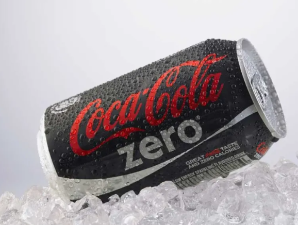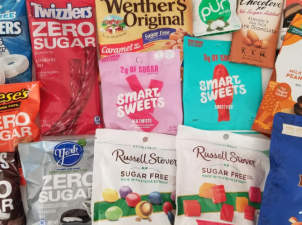In this era of pursuing healthy eating, "sugar-free" foods seem to have become the new favorite of many people. Whether it is sugar-free drinks, sugar-free biscuits, or sugar-free yogurt and sugar-free chocolate, these foods under the banner of "sugar-free" are emerging in the market, attracting the attention of many consumers. However, are "sugar-free" foods really as healthy as advertised by merchants?

What is "sugar-free" food?
First of all, we need to clarify what "sugar-free" food is. According to the provisions of the National Food Safety Standard "General Rules for Nutrition Labeling of Pre-packaged Foods", foods with a sugar content of less than 0.5g/100g (solid) or 100mL (liquid) can be labeled as "sugar-free food". In other words, the so-called "sugar-free" food does not mean that it is completely sugar-free, but that its sugar content is within an extremely low range.
So where does the sweetness in "sugar-free" foods come from? This is thanks to various sweeteners. Common sweeteners include sugar alcohols such as xylitol, sorbitol, and maltitol, as well as high-intensity sweeteners such as aspartame, acesulfame potassium, and sucralose. These sweeteners have the characteristics of high sweetness and low calories, which can give food a sweet taste without increasing the calories of food.
The health myth of "sugar-free" food
In the market, "sugar-free" foods are often promoted as good helpers for health, weight loss, and sugar control. Many consumers therefore believe that as long as they choose "sugar-free" foods, they can enjoy the pleasure of sweets without worrying about excessive calorie intake or high blood sugar. However, is this really the case?
Limited sugar control effect
For diabetics or people who need to control blood sugar, "sugar-free" foods seem to be a good choice. However, it should be noted that although "sugar-free" foods do not contain simple sugars such as sucrose, they may contain other ingredients that can increase blood sugar. For example, some "sugar-free" biscuits, bread and other foods, although they do not contain sucrose, their raw materials are mainly carbohydrates such as flour. These carbohydrates will also be converted into glucose after digestion and decomposition in the human body, leading to increased blood sugar.
In addition, some "sugar-free" beverages may add sweeteners such as glucose syrup and maltodextrin to improve the taste. Although these sweeteners are not very sweet, they also contain calories and will quickly convert into glucose after hydrolysis, which will affect blood sugar.
Therefore, for people who need to control blood sugar, when choosing "sugar-free" foods, they must read the food labels carefully to understand the true ingredients and calorie content of the food.

Weight loss effect is questionable
Many consumers believe that "sugar-free" foods are low in calories and are therefore a good choice for weight loss. However, the truth is not that simple. Although the sweeteners in "sugar-free" foods themselves are very low in calories, many "sugar-free" foods may add a lot of high-calorie ingredients such as oil and starch to improve the taste and texture. For example, some "sugar-free" biscuits, cakes and other foods, although they do not contain sucrose, have a high fat content and even more calories than ordinary foods.
In addition, long-term consumption of "sugar-free" foods may also cause people to become less sensitive to sweetness, thereby increasing their desire and intake of sweets. In this way, not only will the effect of weight loss not be achieved, but it may also lead to weight gain.
Therefore, for people who want to lose weight, choosing "sugar-free" foods is not a one-time solution. What is more important is to control the overall calorie intake, increase the amount of exercise, and achieve a healthy weight loss goal.
Potential risks of "sugar-free" foods
In addition to the limited effects of sugar control and weight loss mentioned above, "sugar-free" foods may also bring some potential health risks.
Impact on intestinal flora
Long-term and large-scale consumption of "sugar-free" foods containing sweeteners may affect the balance of human intestinal flora. Studies have shown that some sweeteners, such as sugar alcohols, are not easily digested and absorbed in the intestines, and may cause discomfort symptoms such as bloating and diarrhea. In addition, some sweeteners may also be fermented by intestinal bacteria to produce substances such as gas and organic acids, further affecting intestinal health.
Increased risk of metabolic syndrome
Some studies have also found that long-term and large-scale consumption of "sugar-free" foods containing sweeteners may increase the risk of metabolic syndrome. Metabolic syndrome is a syndrome of multiple metabolic abnormalities including obesity, hypertension, hyperglycemia, and hyperlipidemia. Although the specific mechanism is not fully understood, researchers believe that this may be related to the effects of sweeteners on insulin sensitivity, energy metabolism, and other aspects.
There are safety risks
It is worth noting that not all sweeteners are safe. For example, artificial sweeteners such as saccharin have been banned or restricted in some countries and regions. This is because long-term and large-scale intake of these sweeteners may cause potential harm to human health. Therefore, when choosing "sugar-free" foods, consumers should try to choose products that use natural sweeteners or artificial sweeteners that have been safety evaluated.

How to choose "sugar-free" foods correctly?
Although "sugar-free" foods have some potential health risks, they are still a relatively good choice for some specific groups of people (such as diabetics, people who need to control blood sugar, etc.). So, how to choose "sugar-free" foods correctly? Here are some suggestions:
Read food labels carefully
When buying "sugar-free" foods, consumers should carefully read the ingredient list and nutritional information table on the food label. Understand the true ingredients and calorie content of the food, and avoid choosing products containing ingredients that can increase blood sugar, such as glucose syrup and maltodextrin. At the same time, pay attention to whether high-calorie ingredients such as oil and starch are added to the food.
Choose regular brands
When buying "sugar-free" foods, consumers should try to choose products from regular brands. These brands usually have stricter quality control systems and more complete product testing processes to ensure the safety and effectiveness of their products.
Eat in moderation
Although "sugar-free" foods are relatively healthier, they should not be consumed in excess. Excessive consumption may still lead to excessive calorie intake and affect the balance of intestinal flora. Therefore, consumers should eat "sugar-free" foods in moderation and reasonably match them as part of a healthy diet.
Choose based on personal circumstances
Finally, when choosing "sugar-free" foods, consumers should also choose based on their actual situation. For example, for diabetic patients, they should choose products recommended by professional doctors or nutritionists; for people who need to control blood sugar, they should choose products with low sugar content and low glycemic index.
"Sugar-free" foods are not completely healthy choices. When choosing and eating, consumers should fully understand their true ingredients and potential risks, and make reasonable choices based on their actual situation. At the same time, we must also realize that the importance of healthy eating is not only about choosing what kind of food, but also about how to reasonably match and eat these foods in moderation. Only by achieving a scientific diet and balanced nutrition can we truly achieve the goal of a healthy life.
